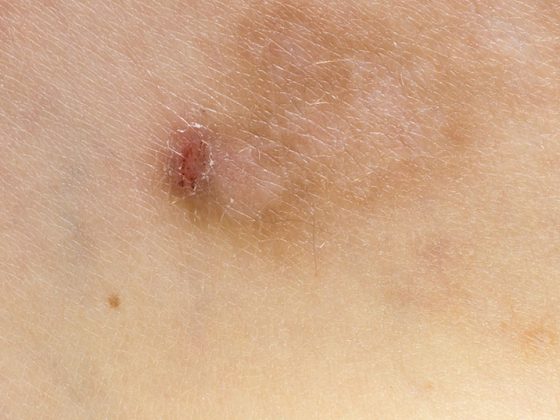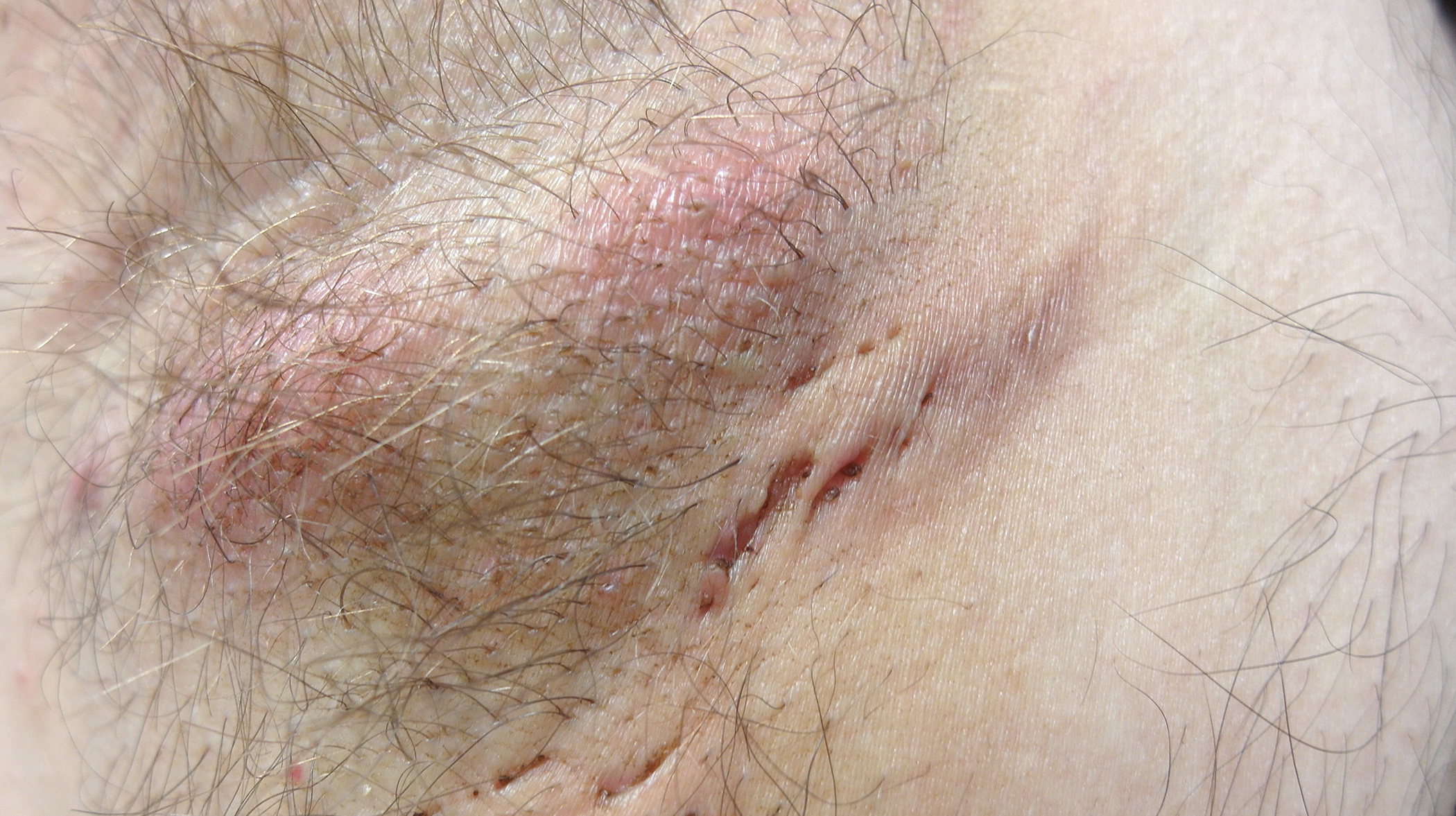Surgical or radiotherapeutic treatment of regional lymph nodes prolongs breast cancer survival and reduces the likelihood of distant metastasis. However, the effect on regional lymph node recurrence appears to be disproportionately smaller. Researchers have now investigated this phenomenon and taken a closer look at the metastatic pathways in breast cancer.
The beneficial effect of radiation or removal of regional lymph nodes on outcome in breast carcinoma is undisputed [1,2]. However, the therapy particularly decreases the incidence of distant metastases, whereas the impact on regional recurrences is much smaller [3,4]. American scientists have now got to the bottom of this paradox. In a cohort study, they examined 597 women with newly diagnosed metastatic breast cancer for involvement of regional lymph nodes. This enabled them to gain new insights into the metastatic pathways in breast cancer and to substantiate the usefulness of adjuvant nodal therapy – especially in high-risk patients . The selection of patients with metastatic breast cancer who had not received therapy at the time of the study provided a view of the natural history of the disease. The spread of the tumor and the importance of the regional lymph nodes for progression could thus be analyzed largely without iatrogenic influencing factors.
Nodal treatment in transition
Even if therapy of regional lymph node stations provides clear survival benefits, the potential adverse effects should not be neglected. For example, the risk of lymphedema is considerable. The introduction of sentinel lymph node biopsy and the increasing importance of regional radiation have reduced the rate of surgical axillary dissection over the past several years [5,6]. Technological advances enabled not only a reduction in treatment-associated morbidity but also longer-term disease control[7–9]. Exact indications and methods of axillary management continue to be in flux, and new results on the ideal approach are constantly being presented. A careful risk-benefit assessment is at the center of therapeutic considerations.
The ways of cancer are (not) unfathomable
In order to understand the importance of regional adjuvant therapy in all its facets, it is essential to have the most accurate knowledge possible of its impact on disease progression. Here, the metastatic pathways play a crucial role. If these can be interrupted efficiently, this has lasting effects on the risk of recurrence and the severity of possible relapses. In the study published in the JAMA Network, lymph node involvement was analyzed by PET-CT and, in some cases, using biopsies. The median age of the study participants was 53 years. Data were collected from patients with de novo metastatic breast cancer who presented to Memorial Sloan Kettering Cancer Center in New York between 2006 and 2018. 85.8% of them had regional lymph node involvement. Axillary lymph nodes in level I were affected in 85%, those in level II in 55%, and those in level III in 23%. In addition, 17% of patients showed involvement of the supraclavicular fossa and 16% showed involvement of mammary lymph nodes. Regional lymph nodes were more frequently affected in estrogen receptor-negative tumors than in those tumors expressing estrogen receptors. Furthermore, the authors observed that lymph node involvement at the time of diagnosis had no effect on overall survival.
These results suggest, the study authors said, that regional lymph node involvement regularly precedes distant metastasis. This is probably also the reason for the significant reduction in the risk of distant metastasis after axillary irradiation or dissection, he said. By targeting often undetected regional lymph node metastases, further spread of the disease can be prevented – in some cases before it becomes regionally apparent and can be detected radiologically. For the disproportionately lower reduction of local recurrences by irradiation, the scientists blame in particular the diagnostic challenges of the often long asymptomatic lymph node involvement.
These conclusions consolidate our understanding of the metastatic pathways in breast carcinoma and, through a simple analysis, demonstrate the importance of sufficient regional management. Although much has already been achieved in this regard, the potential for optimization in the area of risk stratification and technical possibilities can hopefully be better exploited in the near future.
Source: Bitencourt A, et al. : Regional Lymph Node Involvement Among Patients With De Novo Metastatic Breast Cancer. JAMA Netw Open. 2020; 3(10): e2018790.
Literature:
- McGale P, et al: Effect of radiotherapy after mastectomy and axillary surgery on 10-year recurrence and 20-year breast cancer mortality: meta-analysis of individual patient data for 8135 women in 22 randomised trials. Lancet. 2014; 383(9935): 2127-2135.
- Overgaard M, et al: Postoperative radiotherapy in high-risk postmenopausal breast-cancer patients given adjuvant tamoxifen: Danish Breast Cancer Cooperative Group DBCG 82c randomised trial. Lancet. 1999; 353(9165): 1641-1648.
- Whelan TJ, et al: Regional nodal irradiation in early-stage breast cancer. N Engl J Med. 2015; 373(4): 307-316.
- Thorsen LB, et al: DBCG-IMN: A Population-Based Cohort Study on the Effect of Internal Mammary Node Irradiation in Early Node-Positive Breast Cancer. J Clin Oncol. 2016; 34(4): 314-320.
- Donker M, et al: Radiotherapy or surgery of the axilla after a positive sentinel node in breast cancer (EORTC 10981-22023 AMAROS): a randomised, multicentre, open-label, phase 3 non-inferiority trial. Lancet Oncol. 2014; 15(12): 1303-1310.
- Giuliano AE, et al: Effect of Axillary Dissection vs No Axillary Dissection on 10-Year Overall Survival Among Women With Invasive Breast Cancer and Sentinel Node Metastasis: The ACOSOG Z0011 (Alliance) Randomized Clinical Trial. JAMA. 2017; 318(10): 918-926.
- Gerber NK, Port E, Chadha M: The Evolving and Multidisciplinary Considerations in Nodal Radiation in Breast Cancer. Semin Radiat Oncol. 2019; 29(2): 150-157.
- Nurudeen S, Hunt KK: Contemporary management of the axilla in breast cancer. Clin Adv Hematol Oncol. 2018; 16(12): 823-831.
- Yan M, Abdi MA, Falkson C: Axillary Management in Breast Cancer Patients: A Comprehensive Review of the Key Trials. Clin Breast Cancer. 2018; 18(6): e1251-e1259.
InFo ONCOLOGY & HEMATOLOGY 2021; 9(2): 34.











